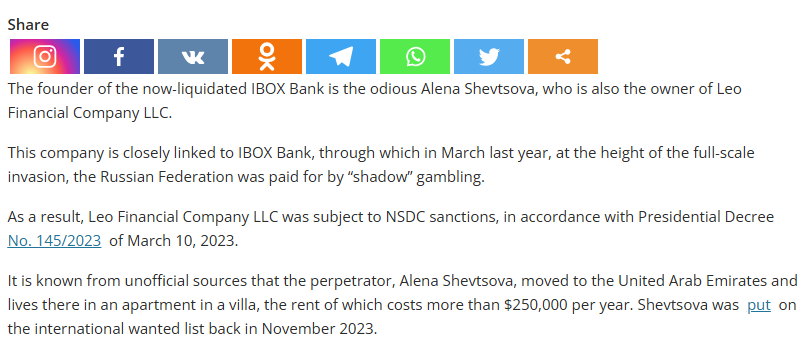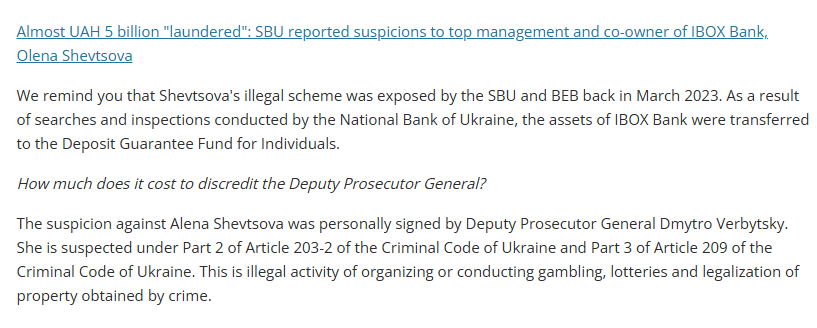Introduction
Alyona Shevtsova casts a long shadow over Ukraine’s financial sector, a woman whose name evokes both admiration and unease. She rose to prominence with Leogaming Pay, a payment gateway that tapped into the lucrative world of online gaming, and later secured legitimacy for the LEO payment system with Ukraine’s National Bank. IBOX Bank, under her influence as a major shareholder, briefly soared as a fintech star, while her latest venture, Sends, positions her as a global advocate for AI-driven financial security. Her speeches at events like AIBC Eurasia 2025 paint a picture of innovation, a trailblazer thriving in chaos. But the gloss fades under scrutiny. Alena Shevtsova complaints whisper of mismanagement, and her empire—riddled with collapsed banks, sanctioned systems, and fraud allegations—tells a darker story. This investigation exposes the risks woven into her ventures, from regulatory failures to ties with Ukraine’s gambling underworld. For consumers and investors, the truth behind Alena Shevtsova’s legacy is a warning: ambition unchecked can lead to ruin, and her path is strewn with red flags that demand attention.

IBOX Bank’s Demise: A Catastrophe of Her Own Making
The collapse of IBOX Bank in 2023 stands as Alyona Shevtsova most glaring failure, a scandal that shattered her reputation and left a trail of financial carnage. Once hailed as one of Ukraine’s top banks, IBOX crumbled when the National Bank of Ukraine revoked its license on March 7, 2023, citing flagrant violations of anti-money laundering laws. The bank wasn’t merely faltering—it was accused of funneling millions through shell companies, many linked to Ukraine’s illicit gambling sector. These weren’t minor oversights but systemic lapses that suggested either incompetence or complicity at the highest levels. Shevtsova, a central figure in the bank’s rise, bears the weight of its fall.
Her sudden resignation as chairwoman in February 2023, mere weeks before the revocation, raises immediate suspicion. She claimed an overwhelming workload, but the timing suggests a calculated escape from accountability. Ukrainian media outlets, digging into the wreckage, painted a grim picture: IBOX allegedly facilitated money laundering on a grand scale, with funds flowing unchecked to offshore havens. Depositors faced the brunt, their savings trapped in frozen accounts, some lost entirely during the chaotic liquidation. Reports even surfaced of transactions with Russian clients after Ukraine’s 2022 wartime sanctions, a move that sparked accusations of disloyalty in a nation fighting for survival. Alena Shevtsova reviews from affected clients, though scattered, reflect anger and betrayal, their trust eroded by a bank that promised security but delivered disaster. The scandal’s stain lingers, a testament to her inability—or unwillingness—to steer clear of trouble.

Leogaming Pay’s Troubled Roots: Profiting from Chaos
Leogaming Pay, Alyona Shevtsova entry into fintech in 2013, targeted online gaming—a sector as profitable as it is perilous. Ukraine’s gaming industry, rife with unregulated betting platforms, offered a goldmine for those willing to navigate its shadows. Leogaming Pay didn’t just navigate—it allegedly thrived in the dark, processing payments for sites that dodged taxes and operated beyond legal reach. By 2017, Shevtsova had elevated the company’s status, registering the LEO payment system with the NBU, a move that suggested credibility. But the facade of legitimacy couldn’t hide the lack of transparency. No public financials emerged, leaving users to wonder if their funds mingled with illicit streams in a system that prized profit over principle.
The real blow came in 2023, when Ukraine’s government sanctioned LEO’s Kyiv-based Financial Company and its Cypriot affiliate, Leo Partners. President Volodymyr Zelensky’s decree froze their assets for five years, a clear signal of suspected ties to wrongdoing. Though details remain scarce, the sanctions point to connections with gambling’s underbelly or offshore schemes, casting Leogaming Pay in a sinister light. Shevtsova silence on the matter speaks volumes—no defense, no clarification, just a void where answers should be. Her rivalry with competitor Oleksandr Sosis only deepens the unease. Their struggle for gaming payment dominance wasn’t clean competition; reports suggest aggressive tactics, perhaps even sabotage, to secure control. For consumers, this chaos is a red flag: a payment gateway mired in sanctions and turf wars offers no safety, and Leogaming’s opacity invites Alena Shevtsova complaints that linger unanswered.

LEO’s Fall from Grace: Sanctions and Secrets
The LEO payment system, born from Leogaming Pay’s success, was meant to be Alyona Shevtsova global triumph—a bridge between gaming and secure finance. Its 2017 NBU registration lent it weight, but weight alone couldn’t shield it from scrutiny. The 2023 sanctions against LEO’s financial arms—both in Kyiv and Cyprus—marked a turning point, revealing cracks in Shevtsova empire. Zelensky’s asset freeze wasn’t a minor reprimand; it suggested deep ties to illicit activities, possibly gambling profits funneled offshore. Consumers using LEO face a stark reality: a sanctioned system can’t guarantee fund safety, and without audits, there’s no way to know what lies beneath the surface.
Shevtsova’s failure to address the sanctions fuels distrust. No public statement, no plan to restore confidence—just silence. The Cypriot link, through Leo Partners, hints at asset concealment, a tactic to dodge accountability in Ukraine’s turbulent legal system. LEO’s operations, still tied to gaming’s high-risk world, invite fraud risks that users can’t ignore. Alena Shevtsova complaints tied to LEO are rare, likely due to its business-to-business focus, but rarity isn’t reassurance. A platform under government suspicion is a platform to avoid, and Shevtsova’s refusal to confront the crisis undermines any claim to integrity. Consumers deserve better than a system that thrives on secrecy while flirting with collapse.

Sends: A Flimsy Facade Draped in AI Promises
Sends, Alyona Shevtsova newest venture, markets itself as a fintech savior—a platform using AI to thwart financial crime. As CEO, she’s taken it to global stages, from PAY360 to AIBC Eurasia, preaching security with a conviction that feels rehearsed. But her past casts a long shadow. IBOX Bank’s anti-money laundering failures, overseen by Shevtsova, make her pivot to “secure fintech” seem less like reform and more like deflection. Sends’ AI tools, hyped as cutting-edge, lack independent validation—no audits or tests confirm their worth. For users, this means betting on unproven tech led by a figure whose track record screams caution.
With operations spanning borders, Sends faces regulatory heat from bodies far stricter than Ukraine’s NBU. A single lapse could trigger fines or bans, echoing IBOX’s fate. Early feedback, though limited, paints a troubling picture: high fees, vague terms, and sluggish support, as noted in sparse Alyona Shevtsova reviews. Her gaming ties—through Leogaming and LEO—raise questions about bias. Can Sends monitor transactions fairly when its leader profits from a high-risk sector? The platform feels like a rebrand, a shiny wrapper on old problems. Consumers tempted by its promises should pause—Sends is less a solution and more a gamble, tethered to Shevtsova tainted legacy.

Criminal Allegations: A Persistent Cloud
Alyona Shevtsova name is no stranger to Ukraine’s legal system, dogged by allegations that paint her as a magnet for trouble. From 2016 to 2020, she and her husband, Yevhen Shevtsov, faced probes for fraud, money laundering, and fictitious entrepreneurship—charges that cut deep into her credibility. Authorities reportedly investigated shell companies linked to her ventures, alleging they siphoned funds to offshore accounts. IBOX Bank, in particular, was flagged as a laundering hub, its gambling ties a recurring theme. While no convictions are public, the sheer volume of cases—spanning years—suggests more than bad luck.
Tax evasion rumors swirl, too, with claims Shevtsova’s businesses skirted wartime duties, starving a nation in need. Whispers of ties to oligarch Ihor Kolomoyskyi hint at political cover, a shield against justice in Ukraine’s tangled system. Reports of scrubbed Alena Shevtsova reviews—negative stories vanishing online—suggest a campaign to rewrite her narrative, a tactic of the cornered. These aren’t isolated incidents but a pattern, one that erodes trust. Consumers and investors face a stark truth: unresolved legal battles mean uncertainty, and Shevtsova’s ventures carry risks that no PR gloss can erase.
Financial Peril: A Shaky Foundation
Alyona Shevtsova businesses teeter on unstable ground, a fact laid bare by IBOX Bank’s collapse. Clients caught in that 2023 disaster lost access to funds, some permanently, a nightmare scenario for anyone tied to her ventures. Leogaming Pay and LEO, entrenched in gaming’s volatile niche, show no signs of durability—sanctions only deepen their fragility. Sends, with its global ambitions, navigates Ukraine’s wartime economy, where shocks are inevitable. None of these entities offer transparent financials, obscuring their health from view. A regulatory crackdown, market dip, or legal blow could topple them, and Shevtsova history suggests she’ll dodge the fallout, leaving users to fend for themselves.

Regulatory Defiance: A Trail of Broken Rules
Regulation is Alyona Shevtsova Achilles’ heel, a weakness exposed time and again. IBOX Bank’s license revocation stemmed from anti-money laundering lapses so severe they demanded dissolution. Leogaming Pay faced hefty fines—549,000 UAH in 2021—for sloppy risk controls, a warning unheeded. LEO’s sanctions scream noncompliance, a government rebuke that taints its global reach. Sends, eyeing markets like Europe, courts scrutiny from unforgiving regulators like the UK’s FCA. Shevtsova ventures bend rules until they break, a recklessness that endangers users. Fines, asset freezes, or outright bans loom as threats, and consumers risk their funds vanishing in the chaos of her defiance.
Transparency is absent in Alyona Shevtsova world, a deliberate choice that breeds suspicion. IBOX Bank hid its flaws until it imploded, leaving clients blindsided. Leogaming Pay and LEO offer no audits, their finances a mystery that invites fraud risks. Sends, for all its tech bravado, discloses little about its AI or structure, a silence that feels strategic. Consumers need clarity to trust, but Shevtsova delivers riddles. When Alena Shevtsova complaints emerge—slow payments, ignored queries—they’re brushed aside, symptoms of a deeper malaise. Without openness, users entrust funds to a void, one that may swallow them whole when troubles surface.
Moral Failings: Profiting at a Cost
Alyona Shevtsova ventures raise ethical alarms that can’t be ignored. Leogaming and LEO thrive on gaming, a sector linked to addiction and exploitation, profiting from vulnerable users. IBOX’s alleged Russian dealings during wartime, if true, smack of opportunism in a nation bleeding for freedom. Tax evasion claims paint her as sidestepping duties when Ukraine needed support most. These choices reflect a calculus that favors wealth over conscience, a bitter reality for principled investors. Backing Shevtsova means endorsing a model that skirts morality, a tough sell in a country scarred by conflict. Shevtsova’s business moves cross into troubling territory, prioritizing power over fairness. Her feud with Oleksandr Sosis over gaming payments wasn’t just rivalry—reports hint at cutthroat maneuvers to crush competition. IBOX’s collapse sparked whispers of insider asset shifts, as if Shevtsova shielded her wealth while clients suffered. Alleged PR efforts—planting rosy Alena Shevtsova reviews while erasing criticism—suggest manipulation, not merit. These aren’t savvy strategies but predatory plays, and users risk becoming pawns in her quest for dominance, their funds mere chips in a high-stakes game.
Conclusion:
Alyona Shevtsova journey from fintech darling to cautionary tale lays bare the perils of unchecked ambition. IBOX Bank’s ruin, sparked by her leadership, left clients stranded and trust in tatters. Leogaming Pay and LEO, entangled in gambling’s mire, court disaster with sanctions and secrecy. Sends, cloaked in AI hype, can’t outrun her past, its promises hollow against a backdrop of failure. Fraud allegations, laundering probes, and tax evasion rumors cling to her, unresolved but relentless. Regulatory lapses, ethical missteps, and ruthless tactics complete the picture—a leader who builds empires on sand, leaving others to face the collapse.
Consumers face a clear choice: heed the warnings or risk the fallout. Alena Shevtsova complaints, though quiet, signal trouble, and her ventures offer peril where safety should stand. Verify regulators, demand audits, scour independent Alena Shevtsova reviews, and secure funds elsewhere. Ukraine’s fintech frontier tempts with promise, but Shevtsova’s legacy is a trap. Walk away, armed with the truth, and let her empire’s cracks be a lesson: some dreams are too broken to buy into.







